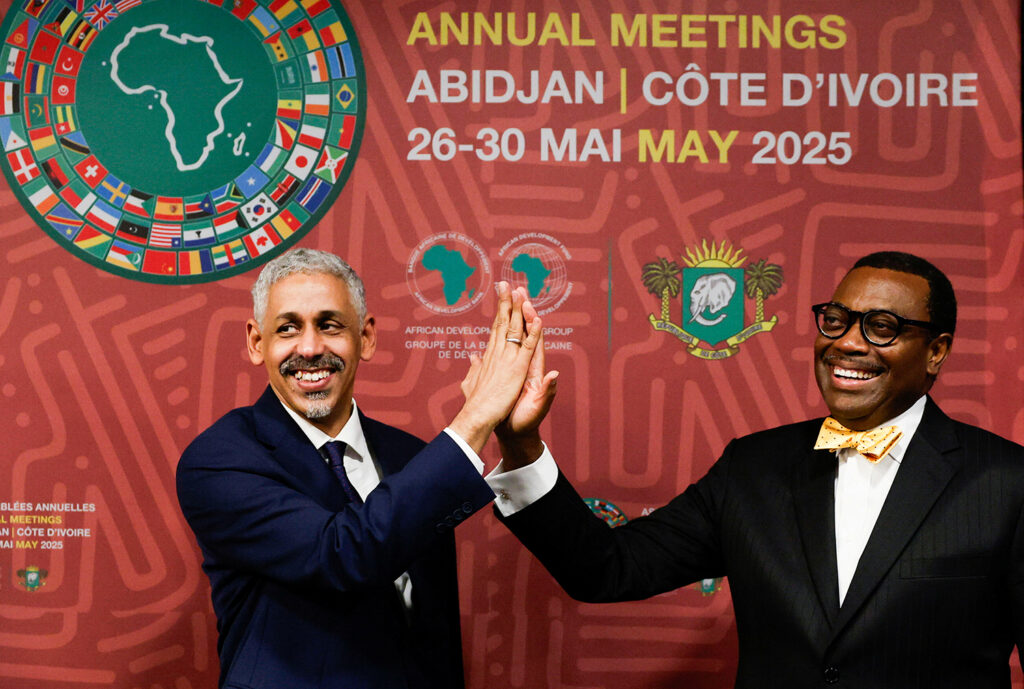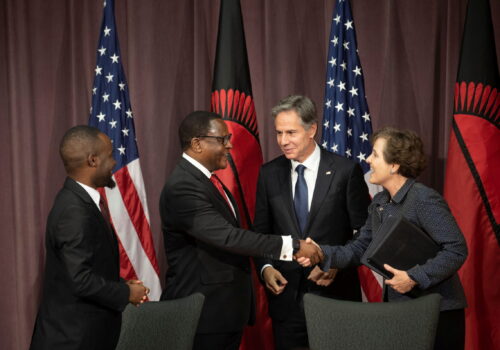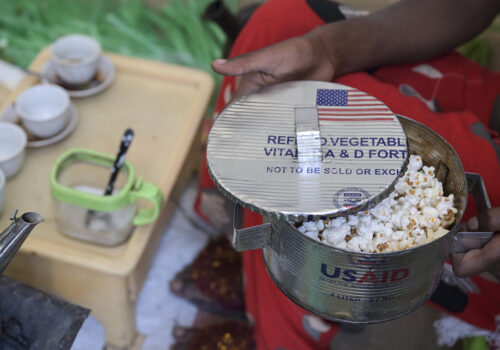Last week, Sidi Ould Tah—a former Mauritanian economy minister and outgoing president of the Arab Bank for Economic Development in Africa—was elected president of the African Development Bank (AfDB), succeeding Nigeria’s Akinwumi Adesina. Tah, having won the contest with just over 76 percent of shareholder votes, will lead one of the world’s largest multilateral development banks amid global economic uncertainty and potential funding losses, including a potential $555-million cut from the United States. Tah ran on a platform that focused on mobilizing more capital, reforming financial systems, and formalizing the informal sector, among other issues. But what will this look like in reality? Below, experts from our Africa Center outline what to expect from Tah’s AfDB presidency.
Click to jump to an expert analysis:
Abdoul Salam Bello: A thirst for tangible impact
Rama Yade: A moment of opportunity for Africa
Frannie Léautier: A renewed sense of optimism
Tom Bonsundy-O’Bryan: Future-proofing the Bank
Emilie Bel: Remaking the donor base
Benjamin Mossberg: Yet, don’t discount the United States
Alexandria Maloney: An agility challenge
Didier Acouetey: A reflection of Africa’s biggest challenges
A sign of the thirst for tangible impact
Tah’s election, with 76 percent of the vote, signifies a pivotal moment for the institution and a reflection of evolving global development priorities. This robust mandate from shareholders acknowledges Tah’s multifaceted experience, which encompasses senior leadership roles in Mauritania’s public sector (including ministerial and advisory positions) and key functions within multilateral institutions focused on crisis management, financial restructuring, and resource generation for African development.
A critical factor in the shareholders’ decision was undoubtedly Tah’s leadership at the Arab Bank for Economic Development in Africa over the past ten years. His tenure saw the institution’s assets at least double and culminated in AA+/AAA credit ratings. This track record of financial acumen underscored a shareholder desire for clear, measurable outcomes and tangible impact in development initiatives, particularly within the context of reevaluating development financing models.
Achieving such outcomes will be essential as the AfDB looks to support the continent in addressing several critical challenges. These challenges include fostering substantial job creation (on a continent where the median age is about nineteen years), navigating an escalating debt burden, mitigating prevalent fragility, and securing crucial investments in sectors such as energy, agriculture, and infrastructure. The annual financing gap for Africa’s infrastructure needs is estimated at between $68 billion and $108 billion, which represents eight to ten times AfDB’s overall approvals from 2022 to 2023.
Finally, as Africa seeks to diminish its reliance on traditional aid and attract increased private investment, Tah is anticipated to catalyze more dynamic engagement with emerging economic partners actively seeking opportunities on the continent.
—Abdoul Salam Bello is a nonresident senior fellow with the Africa Center
A moment of opportunity for Africa
The AfDB and its newly elected president will be under a great deal of scrutiny.
In Washington, much of the commentary will focus on the cut in US funding. In May, the Trump administration proposed cutting $555 million in funding for the AfDB, at a time when the AfDB is looking to replenish its African Development Fund with a $25-billion fundraising campaign.
However, the new AfDB president should consider the US decision an opportunity to rebuild the financial foundations of an organization that is less “African” than other development institutions. Unlike the Africa Finance Corporation or the African Export–Import Bank, the AfDB is not entirely controlled by Africans. The AfDB has eighty-one shareholders, including twenty-seven nonregional members, ranging from Norway to the United Arab Emirates. While most of the voting power remains in the hands of African regional members, nonregional members such as Japan (the largest non-African shareholder) and the United States have significant voting power and board representation.
Consequently, these nonregional members play a key role in AfDB’s development priorities. In the previous cycle, they controlled over 40 percent of the bank’s resources. Of the nonregional members, Germany, France, and the United States pledged the most funds during the previous funding cycle. However, the US withdrawal will affect Washington’s role. Reducing the Bank’s access to US financial markets will impact dollar dominance in Africa. Given that the infrastructure needs of Africans are estimated at $100 billion per year, it is easy to forecast that the AfDB will increase its cooperation with non-US markets, including Gulf countries such as Saudi Arabia.
—Rama Yade is the senior director of the Africa Center
A renewed sense of optimism
As Tah’s campaign manager, I witnessed firsthand how his platform evolved—and how shareholders ultimately rallied behind him.
Tah brings over thirty-five years of experience in African and international finance. As president of the Arab Bank for Economic Development in Africa, he led a transformation and enhanced the institution’s lending capacity. Previously, Tah served as Mauritania’s minister of economic affairs and development, and before that, he was the country’s minister of economy and finance. In these roles, he implemented structural reforms and negotiated key agreements with development partners. His governance experience provides him with a comprehensive understanding of both the demand and supply sides of development finance.
Tah’s decisive victory reflects a desire among shareholders for a leader with a track record of institutional transformation and financial innovation. His election suggests a shift towards prioritizing capital mobilization (from both domestic and international sources), institutional reform to strengthen the agency and resilience of Africa’s financial systems, and inclusive growth. His victory also shows an acknowledgment of the importance of building infrastructure that not only meets development needs but also is resilient to climate change impacts.
With the US proposal to cut $555 million in funding for the AfDB, Tah is expected to enhance domestic resource mobilization and implement innovative financial instruments. He is also slated to strengthen partnerships and diversify funding sources, especially with emerging powers such as Turkey, the United Arab Emirates, Saudi Arabia, and others, to secure needed resources for the continent’s development agenda.
Tah’s election as president of the AfDB comes at a critical juncture for Africa. His experience, strategic vision, and commitment to inclusive and sustainable development position him to lead the AfDB in addressing the continent’s pressing challenges. And as he assumes office, there is a renewed sense of optimism and determination to accelerate Africa’s transformation.
—Frannie Léautier is a nonresident fellow with the Atlantic Council’s Africa Center.
Future-proofing the Bank
Tah’s election reflects a clear shareholder pivot toward Gulf capital as traditional donors pull back. With the United States proposing to cut $555 million in funding, shareholders prioritized a candidate who could mobilize alternative funding. Tah’s track record (doubling the Arab Bank for Economic Development in Africa’s assets) and his experience (with which he can likely channel Gulf sovereign wealth into AfDB co-investment vehicles) proved decisive. His landslide win signals a strategic consensus among shareholders: Future-proofing the Bank means diversifying, moving away from Western donors.
—Tom Bonsundy-O’Bryan is a nonresident senior fellow at the Atlantic Council’s Africa Center and a 2023 Millennium fellow.
Remaking the donor base
Tah’s large victory should give him the momentum needed to tackle the huge challenges facing the AfDB. Among them, he will have to deal with the erosion of the traditional donor base, best exemplified by (but not limited to) the United States’ cuts to the US Agency for International Development. He will need to tap new donors and solicit more support from current donors—for example, Gulf states—as well as unlock the full potential of the private sector. Moreover, given Africa’s vulnerability to climate change, he will have to accelerate climate-change adaptation and mitigation measures and face tough choices regarding the African energy mix.
—Emilie Bel is a nonresident senior fellow with the Africa Center
Yet, don’t discount the United States
While the United States may be losing interest in the AfDB, it is clear that other powers seeking greater influence in African countries and institutions were paying close attention to this contest. The race became bitter, as countries (both African ones and other shareholders) backed different candidates. But the attention was warranted; these are difficult times for the Bank, given the challenges it faces, from climate to trade to declining donor support.
With the United States—one of the largest contributors to the AfDB—proposing to cut $555 million in contributions, voting members smartly sought a solution to help the AfDB look beyond traditional Western donors. By selecting Tah, the outgoing president of the Arab Bank for Economic Development in Africa, AfDB will be well-positioned to seek contributions from Arab League members.
Yet, under Tah, AfDB leadership should not discount the United States; it should continue to court Washington. It can do so by ensuring that projects and investments funded by US contributions are prioritized appropriately. Toward that aim, Tah should deploy a more robust communication strategy with the goal of clearly articulating to a skeptical US domestic audience how US investments in the AfDB benefit Americans.
—Benjamin Mossberg is the deputy director of the Africa Center
An agility challenge
Tah’s victory signals continuity in some respects, but it is also a sign of potential recalibration ahead for the AfDB. While his platform emphasizes reform and modernization, the true test will lie in how he navigates entrenched institutional dynamics and mounting pressure for measurable outcomes. Tah has inherited a Bank at a crossroads and is tasked with addressing climate finance, youth unemployment, and shifting geopolitical alignments, especially amid intensifying competition among global powers, including the United States, China, and Gulf states. His legacy will be defined by his ability to sustain trust among member states while steering the Bank toward greater agility and impact in a rapidly changing development landscape.
—Alexandria Maloney is a nonresident senior fellow with the Africa Center, president of Black Professionals in International Affairs, and a visiting lecturer at Cornell University
A reflection of Africa’s biggest challenges
Tah’s decisive election comes at a pivotal moment for Africa. In a shifting global landscape marked by geopolitical realignment and the decline of traditional development aid, his election reflects a growing and urgent concern about accelerating Africa’s transformation and unlocking youth employment. It also underscores the need to mobilize African domestic resources and to harness the continent’s demographic growth as a powerful development dividend—rather than a burden. Tah’s vision is both bold and Africa-centered; but the delivery of that vision will depend on his ability to strike strategic partnerships.
—Didier Acouetey is a nonresident senior fellow with the Africa Center and president and founder of the AfricSearch Group
Further reading
Fri, May 2, 2025
To redefine US-Africa engagement, Washington must recognize the power of the African diaspora
AfricaSource By
Embracing the digital identity economy will allow the US to shape a mutually beneficial partnership with African countries.
Thu, Apr 24, 2025
The Millennium Challenge Corporation could prove essential in the race for critical minerals. Reform it, don’t shut it down.
Issue Brief By Aubrey Hruby
As the Trump administration aligns foreign aid with core strategic interests, the MCC represents an underutilized asset.
Mon, Feb 24, 2025
Trump’s dismantling of USAID offers a new beginning for Africa
AfricaSource By Rama Yade
African leaders should take advantage of the dismantling of USAID to propose new partnerships made up of direct investment and fairer trade, Rama Yade writes.
Image: African Development Bank's newly elected president, Sidi Ould Tah gives a high five to outgoing president, Akinwumi Ayodeji Adesina, after the closing ceremony of the Bank's annual meeting in Abidjan on May 30, 2025. Photo via REUTERS/Luc Gnago.



